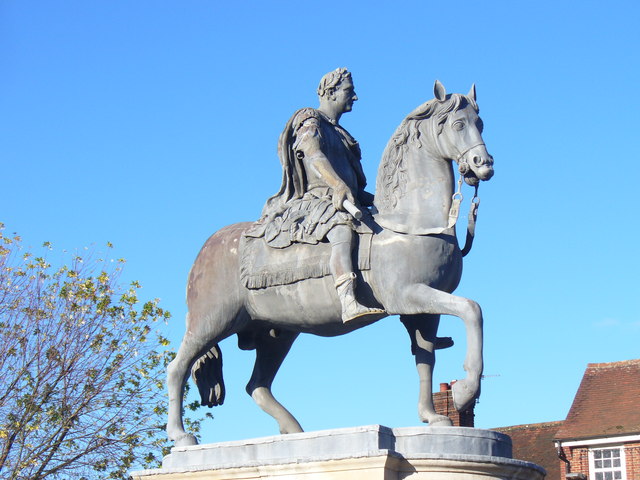Lead Equestrian Statue of William III.
In Roman Armour.
Circa 1750.
by John Cheere.
Formerly Gilded.
Petersfield, Hampshire

In 1734 John Jolliffe nominated as M.P. his uncle
Sir William, Jolliffe, who served until 1741 with Edward Gibbon II. John Jolliffe
served as M.P. 1741, 54 and 1761 to 68. After 1761 there followed a long period
when a member of the Jolliffe family represented the Borough of Petersfield
until 1866, except 1835 - 41, when John Hector Cornthwaite served. Sir William Jolliffe strongly supported the Protestant succession, symbolised by William III.
After
the 1745 Jacobite troubles, he wished the Jolliffe family to be visibly aligned
with Protestantism.
Sir William Jolliffe died in 1749 and, in his will, left
his three nephews £500 in order to erect an equestrian statue to William III in the
Borough.
The statue by John Cheere was erected first in the circus at the
entrance to Petersfield House demolished in 1793 (which today is the centre of the road by the
Police Station).
The statue was moved to its present position in the town centre in 1812.
Mr. John Jolliffe built
Petersfield House in the Lawn where was previously the residence of his
father-in-law, Mr. Robert Michell. It was a fine red-brick mansion with stone
facings of the style of Queen Anne. It occupied the site of the schools and the
police-station between St. Peter's Road and Hylton Road, and traces of
artificial canals can still be seen. When the house was pulled down in 1793,
due to parish disputes, the entrance gates of Sussex iron were removed to
Merstham House, Redhill, where they are at the present day.
For the Royal Equestrian Statues see - Reading the Royal Monument in Eighteenth Century Europe by Charlotte Chasel Rousseau, 2011.




No comments:
Post a Comment